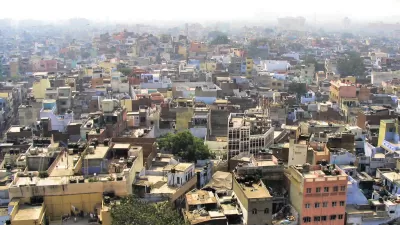Research into the various shapes of cities in India may be able to predict the economic success of the city's residents.

Wharton professor of real estate, Mariaflavia Harari writes in Knowlede @ Wharton about her research into the influence of the shape of a city on the economic success of residents and businesses. "My research question was what influence, if any, does a city’s shape have on the location choices of consumers and firms? Do consumers and firms benefit in terms of welfare or productivity from locating in cities with particular shapes?"
Harari’s research has made some interesting linkages between the shape of the city and average local wages and housing rents. More compact cities tend to have higher wages and rent, with circular cities being the most ideal for reducing commute times and improving efficiencies. However, since no city can be a perfect circle, Harari looks at the consequences of natural geography on a city.
…I’m not simply making a crude comparison between compact and non-compact cities in my analysis. I look at what happens when a given city becomes less compact as a result of hitting some topographic obstacle, like a mountain or a lake, as it expands in space. What I find is that when a city ends up with a worse geometry because of hitting some geographic constraints, its population growth slows down, and housing rents and local wages tend to decrease.
Harari writes that her research can have an impact, particularly in India, where growing cities are sprawling outward due to restrictions on building heights that limit opportunities for compact development that could lead to better efficiencies.
FULL STORY: What Urban Design Reveals about Economic Development

Alabama: Trump Terminates Settlements for Black Communities Harmed By Raw Sewage
Trump deemed the landmark civil rights agreement “illegal DEI and environmental justice policy.”

Study: Maui’s Plan to Convert Vacation Rentals to Long-Term Housing Could Cause Nearly $1 Billion Economic Loss
The plan would reduce visitor accommodation by 25% resulting in 1,900 jobs lost.

Planetizen Federal Action Tracker
A weekly monitor of how Trump’s orders and actions are impacting planners and planning in America.

Waymo Gets Permission to Map SF’s Market Street
If allowed to operate on the traffic-restricted street, Waymo’s autonomous taxis would have a leg up over ride-hailing competitors — and counter the city’s efforts to grow bike and pedestrian on the thoroughfare.

Parklet Symposium Highlights the Success of Shared Spaces
Parklets got a boost during the Covid-19 pandemic, when the concept was translated to outdoor dining programs that offered restaurants a lifeline during the shutdown.

Federal Homelessness Agency Places Entire Staff on Leave
The U.S. Interagency Council on Homelessness is the only federal agency dedicated to preventing and ending homelessness.
Urban Design for Planners 1: Software Tools
This six-course series explores essential urban design concepts using open source software and equips planners with the tools they need to participate fully in the urban design process.
Planning for Universal Design
Learn the tools for implementing Universal Design in planning regulations.
Caltrans
Smith Gee Studio
Institute for Housing and Urban Development Studies (IHS)
City of Grandview
Harvard GSD Executive Education
Toledo-Lucas County Plan Commissions
Salt Lake City
NYU Wagner Graduate School of Public Service


























